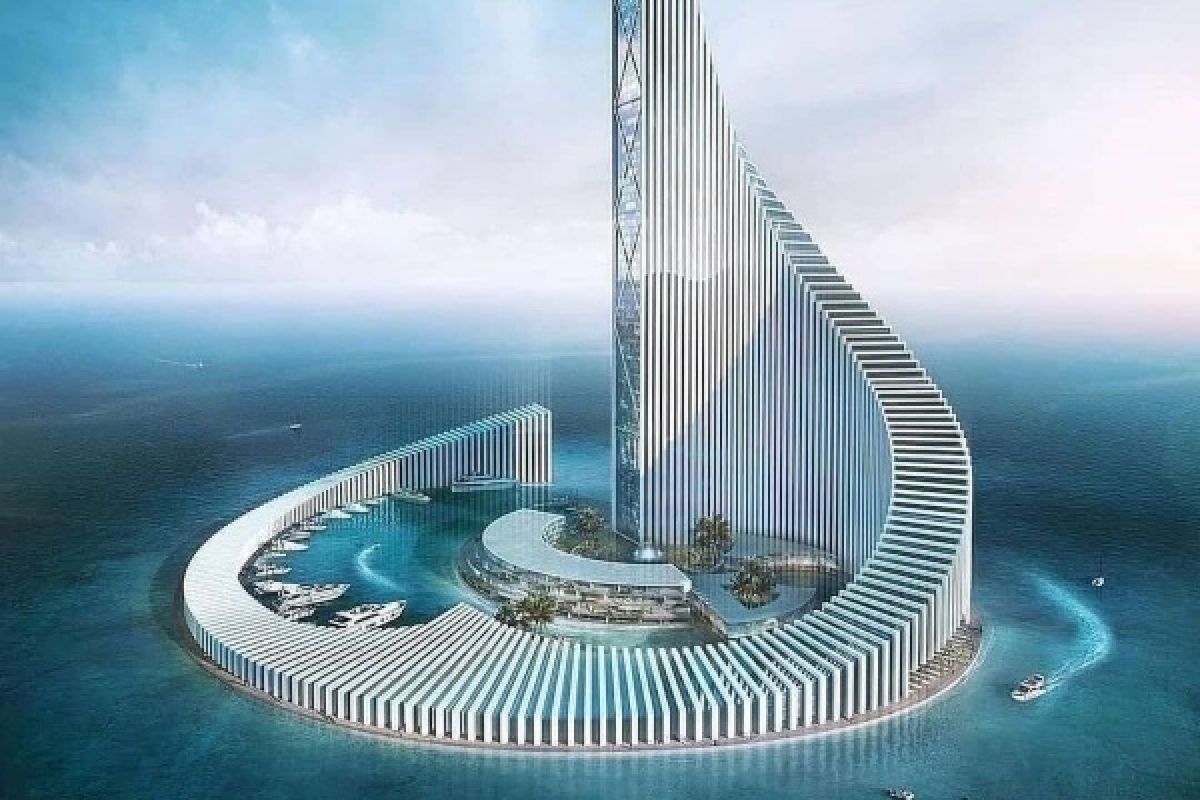
Restriction-free Zanzibar saw visitor numbers skyrocket during the pandemic. But as the rest of the world emerges from self-inflicted downturns, Judy Cogan discovers the Tanzanian archipelago is looking to build on its tourism success, with a new 70-storey skyscraper, airport and multi-billion-dollar investment opportunities designed to lure foreign investors to its white-sand shores.
The spice islands of Zanzibar have traditionally been a hub for merchants, explorers and, until recently, backpackers.
But since the global pandemic, this semi-autonomous Tanzanian archipelago has emerged as the destination for wealthy tourists looking to escape punitive lockdown restrictions, and enjoy the sort of five-star resorts shuttered in the Maldives, Seychelles, South Africa and Thailand.
This upward trend is only going to skyrocket now the Revolutionary Government of Zanzibar has announced it will open up 10 of Zanzibar’s smaller islands for foreign investment and development opportunities.
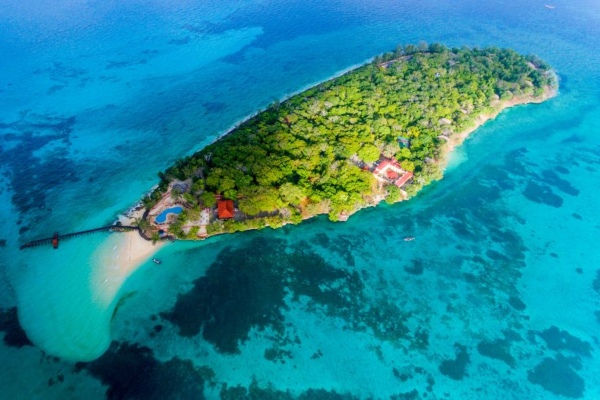
Open for business: Changuu Island (above), one of the 10 smaller islands available for foreign investment.
The ground-breaking move is being implemented by the Zanzibar Investment Promotion Authority (ZIPA).
To date, the authority has approved 761 investment projects with capital in excess of $7.17 billion, leading some within the global media to describe Zanzibar as ‘the new Dubai’.
It’s an apt comparison. In September this year, plans were announced to build a 70-storey spiral-shaped skyscraper in Zanzibar that will be the tallest in Africa after Egypt’s Iconic Tower.
The $1.3bn Zanzibar Domino Commercial Tower is being developed on an artificial island by Tanzania’s AICL Group and Edinburgh-based investment company Crowland Management.
Appropriately, it was designed by xCassia, an architecture, design and branding firm based in Dubai and New York.
Youssef Amour, the executive chairman of AICL group, said the aim was to build ‘one of Africa’s first truly iconic global destinations for tourism, entertainment, culture and conferencing’.
But the aim for Zanzibar’s authorities isn’t just to attract wealthy tourists.
Among the incentives are a residency permit that authorises real-estate buyers, their partners and a maximum of four children under the age of 20, to live in the country after purchasing a property.
There is also a 50 per cent exemption on capital gain on purchased properties, 100 per cent foreign ownership, 100 per cent exemption from worldwide income for foreigners and the added benefit of no minimum stay being required.
ZIPA Executive Director Shariff A Shariff said the small islands that fringe Zanzibar’s white-sand coast are major assets holding enormous potential for both investors and the island’s residents.
But Zanzibar’s government recognises that these islets possess sensitive ecosystems and are already home to thriving fishing and agricultural communities.
As such, potential developments require careful planning, handling, guidance and oversight.
‘Potential investors will need to adopt a holistic approach in implementing future projects,’ explained Shariff.
‘They should also demonstrate financial capacity, and skills in conserving environments, biodiversity, cultural heritage and community development. Interested investors should provide detailed information on the kind of high-end investment intended.’
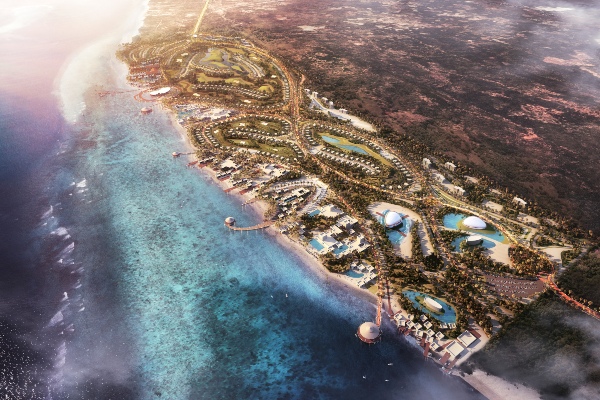
Under construction: Blue Amber Zanzibar (above).
Meanwhile, the highly anticipated Blue Amber Zanzibar will be the largest luxury resort in Africa when complete, offering non-residents the opportunity to buy vacation homes, which start from just under $200,000 for a two-bed, two-bath villa with private deck and pool.
Located in Matemwe on the northeastern coast of Unguja, as Zanzibar’s main island is officially known, the sprawling $1.6 billion ‘luxury tropical community’ will have an underwater nightclub, deep-water marina, private international school and host East Africa’s first championship Ernie Els-designed golf course.
There will also be five leading hotels, including a Ritz-Carlton and Anantara, an aqua park, a glamorous souk selling high-end local goods, an equestrian centre and a superyacht facility.
So far, so Dubai.
But as Saleh Said, the managing director of Blue Amber Zanzibar, told Forbes last year: ‘This isn’t just a holiday resort, but a sustainable development creating some 5,000 jobs during construction and 5,000 others permanently.’
Developed by Pennyroyal Gibraltar, Blue Amber Zanzibar will be built in five phases over the next 15 years.
Although the Covid-19 pandemic has delayed work, the first phase began last year and is scheduled for completion in the next two years.
Phases one and two will include a visitor centre and leisure centre, alongside more than 20 retail shops, service outlets and a beach restaurant. A boutique hotel, 54 pool villas and a golf course are also being developed in the first two phases.
Subsequent phases will include the development of further hotels, a private airport with a 9,842-foot runway, a world-class medical facility, 1,914 luxury villas plus 3,440 apartments priced anywhere between $700K and a Dubai-worthy $10 million.
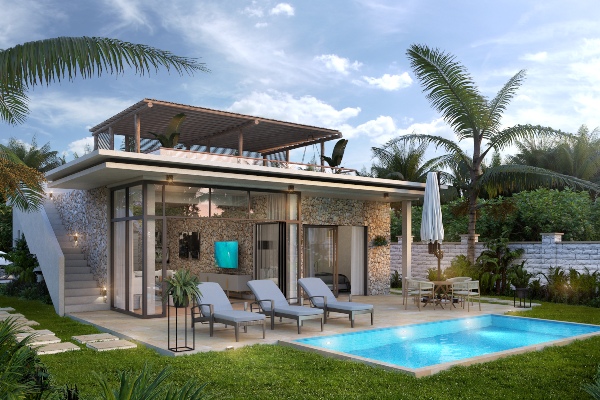
A two-bed villa with pool at Blue Amber Zanzibar will cost less than $200,000. Above is an artist's impression.
A representative of the resort told NewsAfrica: ‘Zanzibar and Dubai share some resemblances – geographically, both lie on coastal areas surrounded by giant masses of water, which makes both regions excellent hubs for shipping exports and imports. Both have also demonstrated strong, consistent tourism sector growth. However, Zanzibar is a laidback, authentic, island destination, very different to the fast-paced lifestyle Dubai offers.’
Blue Amber Zanzibar is currently the largest resort development of its kind in Africa and a number of villas have already been reserved since sales started in June of 2021. The markets showing a keen interest are Kenya, South Africa, Romania, Russia and Bulgaria.
The Blue Amber representative said: ‘The resort is a prime location as an oceanfront property in the peaceful, relatively undeveloped Matemwe area. Its 4km beachis also one of the most beautiful in the world.
'We are expecting a mixed community of permanent residents, transient residents, who visit on weekends and during holiday periods, as well as vacationers.’
With property values approximately half of those in some neighbouring countries, accessing the residential market in Zanzibar is financially less demanding.
‘A large proportion of buyers are investors seeking real-estate opportunities outside of their home countries, where they will receive attractive returns and tax benefits, which Blue Amber offers,’ the representative explained.
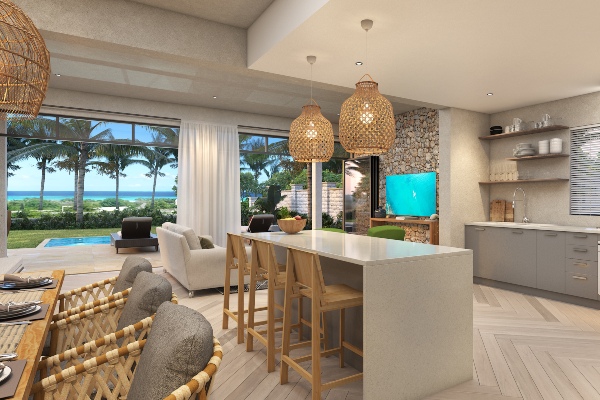
Ex-pats will be able to live permanently at Blue Amber Zanzibar. Above is an artist's impression of one of the villa's interiors.
In July this year, the government of Zanzibar announced they will introduce a new tax and residency investment scheme available for foreigners wanting to live and invest in the region.
The game-changing measure comes on the back of the existing infrastructure and tourism-friendly initiatives that allowed Tanzania to weather much of the storm brought on by the downturn in global trade as a result of lockdown measures in the West, Asia and the rest of Africa.
Until now, the Investments Act of 2018 supported Strategic Investment Status (SIS) projects with incentives and allowances to real-estate developers. However, the same was not offered to individuals wanting to buy property in the country.
Now real-estate investors are able to acquire a residency permit, and live as a family in Zanzibar as a non-citizen. They are also not required to live in Zanzibar permanently.
It is hoped Zanzibar will be able to attract the level of real-estate investment that countries such as Mauritius, Dubai and Singapore have thrived on after implementing this strategy.
A representative from Pennyroyal Gibraltar said: ‘Villa sales were launched in June of this year and we have received an overwhelming response from all over the world as a result of our targeted global marketing campaign and the country’s leaders’ proactive approach to forge ahead with plans to make Tanzania more attractive to foreign investors.
'The new Zanzibar tax-and-residency programme has boosted enquiries and overall interest in the project.’
In a world where governments have largely followed one another in their approach to managing the Covid-19 pandemic, Tanzania was the only country in Africa to have taken an unapologetically lax approach to restrictions.
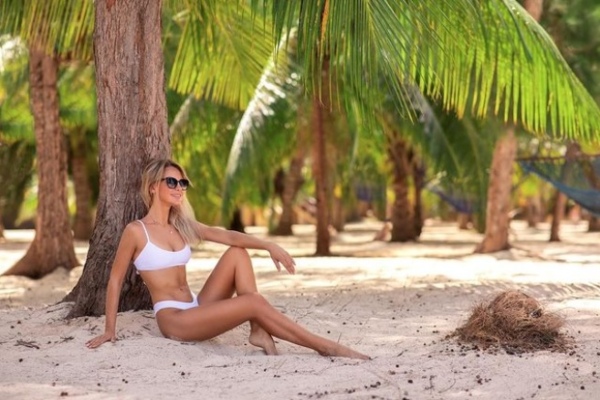
While the world was locked down, in Zanzibar ex-pats and tourists enjoyed normality. Photo: Instagram user @alice_in_zanziland.
From the outset, its late-president, PhD scientist John Magufuli, refused Chinese-style lockdowns and instead followed established pandemic preparedness plans, hailing the nation’s economy ‘more important than the threat posed by coronavirus’.
This approach, which led to Tanzania being dubbed the ‘Sweden of Africa’ by the world media, appears to be paying off when it comes to the country’s economic stability, with Tanzania recording substantial growth throughout the pandemic, while its neighbours entered their first recessions in a quarter of a century.
Zanzibar in particular has fared particularly well since March 2020, with British, Russian and US visitors flocking to the Tanzania islands to avoid severe lockdown restrictions in their own countries.
The pandemic has transformed the archipelago from a holiday destination hotspot to a coronavirus escape haven for international travellers skirting the restrictions elsewhere.
Alan Richardson, a retiree from the UK, told NewsAfrica how he normally goes to Asia for the British winter, but made the switch to Zanzibar last winter due to its less-repressive pandemic response: ‘All of Asia was closed and the only country on the planet that would let people in without any restrictions was Tanzania.’
The same rationale drew American writer Jerome Armstrong from Los Angeles to Tanzania for nine months during 2020/21.
The journalist loved his time in the country so much he even bought land to build a family home, and enrolled his daughter in an international school in Arusha, on the Tanzanian mainland.
He told NewsAfrica: ‘I went to Tanzania for the same reason most did: to get away from the media and governments that were spreading fear and misinformation about coronavirus.’
With little-to-no restrictions in place, Tanzania surpassed expected visitor numbers in 2020, despite enormously unfavourable conditions due to global travel bans. It recorded more than 620,000 foreign tourists in the 2020/21 financial year – almost 200,000 more than was anticipated before the pandemic.
‘Most of the people I met from the West in Zanzibar were there for the first time, and because it allowed them to escape from the curfews, masks and anti-social rules like lockdowns,’ said Armstrong. ‘One British woman I met told me, “I don't want to be anywhere else until this is over.” It is a very free and friendly place, with parties every night.’
In Zanzibar, masks were mandatory in March 2020, but quickly scrapped. The few other restrictions in place, like college closures, were also quickly reversed, and President Magufuli called lockdowns a betrayal of the founding principles of Tanzania.
‘They have a saying in Tanzania,’ explained Armstrong: ‘They say “dance however you want, just don’t touch me”, which sums up their attitude toward freedom and letting others do as they please.’
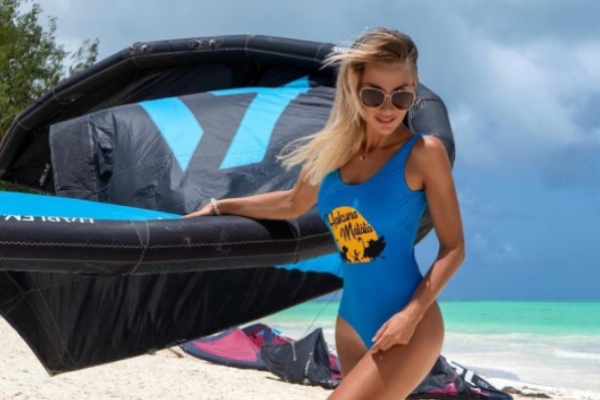
Zanzibar resident and Influencer @alice_in_zanzibar (above) has enjoyed normality while the West was in lockdown.
But while Zanzibar’s government is working hard to attract capital, persuading international investors to take a bet on the African property market is no mean feat.
Thousands were scammed in Morocco’s biggest-ever property scheme last year.
News of the scam broke in April 2020 with more than 600 million dirhams ($65 million) allegedly disappearing, leaving more than 1,000 buyers out of pocket, according to one of the lawyers representing them. Adverts on state television had promised dream homes but it was all a fantasy.
The money was allegedly embezzled by cashing ‘advances ranging from 20 per cent’ to the full cost of the apartment.
There is no evidence of such widespread fraud having ever taken place Tanzania, however, Armstrong, who like a lot of Westerners has ‘bought’ land in the country using a local friend’s name, said buying property abroad is not without its risks.
‘It is fairly easy to buy land as an expat and become a resident, but it’s worth noting you will never really own the land you buy. You lease it for 33, 66 or sometimes 99 years and then it gets renewed.’
But while the archipelago looks to relax the law surrounding foreign ownership, work is well under way on boosting tourism capacity.
On May 30, 2020, Terminal 3 at Zanzibar’s previously rundown Amani Karume International Airport opened for departures.
New arrivals are still processed at the old terminals, but from there tourists are quickly chauffeured through the palm-fringed interior, past ancient spice plantations still worked by oxen, to luxury hotels on the east and north of the island. One of the most popular of these is Zuri Zanzibar.
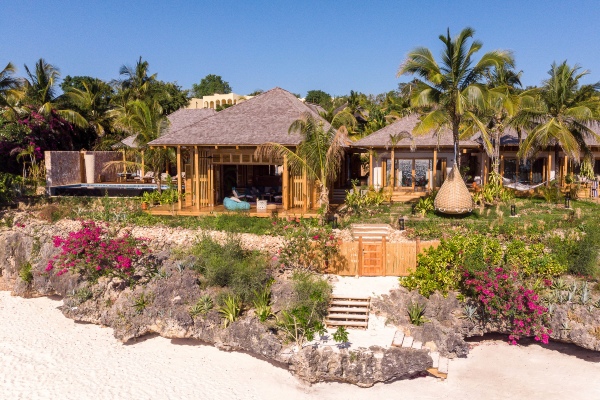
The luxury beachfront resort of Zuri Zanzibar (above) has successfully weathered the global downturn in tourism.
Briefly shuttered at the start of the pandemic, the resort’s Instagram feed is covetously followed by tens of thousands of social-media users in locked-down Europe and North America, dreaming of the beach parties and carefree lifestyle they once enjoined themselves.
Marianna Kisvardai, the resort manager at Zuri Zanzibar, explained what life has been like at hotels like hers while the rest of the world has been in deep freeze: ‘Zuri closed at the end of March 2020, as there were no flights in and out. But this period gave us a moment to prepare and revise our operations for the coming months.’
The resort reopened in August 2020 and their 56 villas, bungalows and suites set among tropical gardens and overlooking the white-sand beachfront, soon filled up with guests of a slightly different kind to pre-Covid times.
‘After opening the resort, we started to receive guests from Europe and slightly higher numbers from the Arabian Peninsula,’ Kisvardai explained.
‘We noticed more families travelling together and staying for longer stretches. Some decided to extend and stay for over two weeks as their kids were out of school and doing online work or courses. It’s normally couples on shorter stays.’
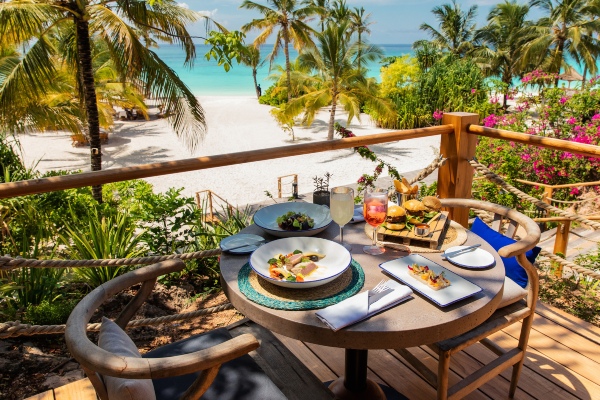
Guests have enjoyed five-star luxury at Zuri Zanzibar while resorts in the Seychelles, Mauritius and Thailand have been shuttered.
Luxury accommodation at Zuri comes with terraces and outdoor showers, suites have private whirlpools all steps away from the crystalline waters of the Indian Ocean.
Guests regularly gather for sundowners served up on the beachfront to jaw-dropping sunsets and soothing DJ sets before enjoying haute cuisine dining on the sands or at its open-sided clifftop restaurant.
Kisvardai added: ‘Zuri has a very special setting which allows guests to feel free and secluded in our large open gardens. It’s an unrestricted, friendly and flowy space and this was a reassurance for their safety during the challenging times.
‘Of course, we adjusted our operations to keep both teams and guests safe and comfortable. But Zuri will never be the typical confined and organised space you come to expect from other luxury resorts.’
Now as the world slowly opens up again and adapts to post-lockdown life, the staff at the yet-to-be-completed Blue Amber resort are feeling hopeful.
Their spokesperson told NewsAfrica: ‘The market outlook in Zanzibar looks bright. Its long- and short-term benefits for investors and developers alike are clear to see. We are very fortunate in that our timing has put us in a strong position as a new brand in the market; but our implementation demonstrates to everyone that we are fulfilling our promises.’



